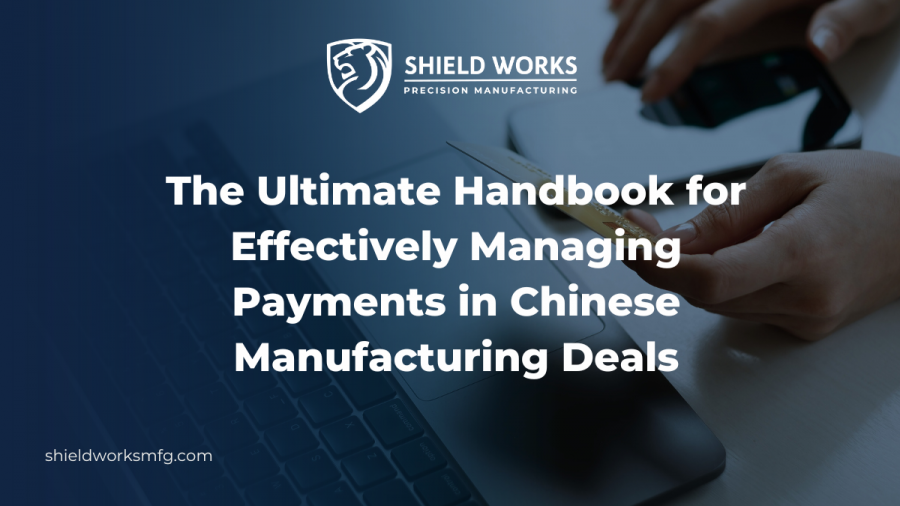Posts Tagged ‘Chinese Manufacturing’
The Ultimate Handbook for Effectively Managing Payments in Chinese Manufacturing Deals

With the rise of China as a major manufacturing hub, many companies in the West are outsourcing their production to China. However, navigating payments with these Chinese manufacturers and suppliers can be challenging and requires a thorough understanding of the payment methods commonly used, as well as effective negotiation skills. In this ultimate handbook, we will walk you through the intricacies of dealing with Chinese manufacturers, payment methods, currency matters, negotiating tactics, and everything else you need to ensure seamless financial transactions. Continue reading whether you’re an experienced importer or a newbie dealing with manufacturers; you’ll certainly find something beneficial!
Understanding the Commonly Used Payment Methods in China
When it comes to transacting with manufacturers and suppliers in China, three main payment methods stand out:
- Letter of Credit (LC)
- Telegraphic Transfer (TT)
- Open Account (OA).
1. Letter of Credit
A Letter of Credit, or LC, can be described as a payment safety net. The buyer’s bank promises to pay the seller, provided certain conditions and requirements are met. This is an attractive option for those who prioritize security, as it provides a layer of protection against non-fulfillment of contractual obligations.
2. Telegraphic Transfer (TT)
Then there’s the Telegraphic Transfer, often abbreviated as TT. This is essentially a straightforward, no-frills bank transfer from the buyer to the seller. It’s a globally recognized method that works quickly, making it ideal for those who value speed and convenience.
3. Open Account (OA).
Finally, we have the Open Account or OA method. This method represents trust in the business relationship. Here, the buyer makes the payment only after receiving the goods from the seller. It’s a great option if you have a strong, long-standing relationship with your Chinese manufacturer.
Negotiating Favourable Payment Terms
In the world of international trade, negotiation is an art form. Terms that you should specify may include the payment schedule, the method of payment, and any penalties for late payments or non-payments. It is recommended to seek legal advice when drafting payment terms to ensure they are enforceable and in accordance with local laws.
However, while it’s essential to aim for the best possible terms, it’s equally important to strike a balance. Negotiations that are too aggressive may backfire and result in strained relationships. Remember, successful partnerships are not just about immediate gain, but about fostering trust and respect that paves the way for long-term mutual benefits.
Ensuring Secure Transactions
Securing your transactions in the cyber era is a task that carries paramount importance. Ensuring that your payments to manufacturers are safeguarded against digital threats is a crucial step in effectively managing your business dealings. The foundation of secure transactions lies in the implementation of robust security measures such as encryption and strong authentication protocols. These safeguards fortify your transactions against unwanted intrusions and cyber threats, providing a secure pathway for your payments.
Beyond this, conducting regular audits can help you identify any vulnerabilities or irregularities in your payment processes. This proactive approach can help you detect potential issues before they escalate, allowing you to maintain the integrity of your transactions.
Dealing with Currency Exchange Rates
Currency exchange rates, ever-fluctuating in the global economy, can dramatically affect the whole production cost. One proactive strategy to tackle this challenge head-on is to use a forward contract. Essentially, a forward contract is an agreement that allows you to “lock in” an exchange rate now for a transaction that will take place in the future. By doing so, you effectively shield yourself from any adverse changes in exchange rates that could occur between now and then.
Another savvy option to consider is the establishment of a multi-currency account. This tool grants you a greater level of control over your money’s exchange. By allowing you to hold multiple currencies in a single account, you can choose when to make your exchanges based on favorable rates, rather than being at the mercy of the current rate at the time of your transaction.
Resolve Payment Issues Quickly
If any payment issues arise, it is important to address them promptly and constructively. Communication is key in resolving payment issues, so make sure you have a reliable channel of communication open with your manufacturer. Additionally, it may be necessary to seek legal advice if there are any disputes over payment.
Monitor Progress and Compliance
Regularly monitoring the progress of your deal and ensuring that your manufacturer is complying with your agreed payment terms is essential. It is recommended to set up regular meetings or phone calls with your manufacturer to discuss progress and payments. Additionally, you should keep track of any correspondence related to payments, including emails or letters, to ensure accurate record-keeping.
If you’re looking for a reliable manufacturing partner that has adequate final knowledge as well as industrial experience, Shield Works is the answer. Our CFO Mark Clayton is a member of the accounting bodies AAT & CIMA. And our executive team members are British with decades of experience in the manufacturing industry. Leveraging our expansive knowledge base and keen industry insights, we offer top-tier contract manufacturing services designed around your specific needs, all with zero risks. Contact us today to find out how our customized solutions can boost your business’ growth.
